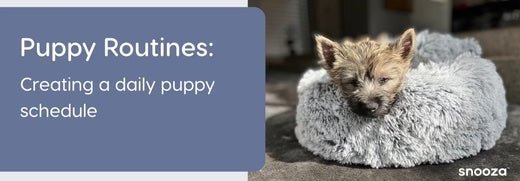Bringing home a puppy can be a bit overwhelming; there is so much to do between vet visits, training, socialising and playtime and it can be hard to know what to do and when.
Setting up a routine from the start will be helpful for you and everyone who is caring for your puppy, as you can all follow the same schedule. It is also beneficial for your puppy and will help them to feel secure, build their confidence and establish good habits quickly. A routine will help with toilet training, eating habits and building their confidence.
Create a routine that works for you; some things to consider are:
Mealtimes
Most puppies eat three meals a day, and you can plan mealtimes around your

meals if you want.
Toilet training
Set your puppy up to win by taking them on plenty of toilet breaks throughout the day. Remember, puppies should be taken out after a nap or when you let them out of their crate and after meals. Make sure they're taken out at least every 2 hours while you are toilet training to prevent the opportunity for accidents.
Playtime
Play time is great bonding time for you with your puppy and necessary for their development and should be adjusted depending on their size, age and breed.
Naps
Your puppy will sleep a lot at first, and using a crate or playpen will help you set up a sleep routine quickly. Plus, your puppy will learn that they have a safe place to retreat to at any time. Children must be taught to leave the puppy alone if they are asleep.

Bedtime
This is entirely up to you; you may want your puppy to settle for the night the same time as you, or earlier. A regular bedtime will help them get used to the routine.
Training
Allocate some time each day for training sessions. Keep sessions short - 5 minutes per session is usually plenty. Puppies respond well to training when they are well rested and hungry, so schedule short training sessions before their daily meals and during the times they are alert and active.
Your puppy's daily schedule could look something like this:
Morning wakeup
Take your puppy outside, wait for them to do their business, and reward them with treats and praise.
Breakfast
Feed your puppy, and remove uneaten food after about 15 minutes. Wash food and water bowls and provide a bowl of fresh, clean water. Take your puppy outside again to toilet and wait patiently.
Playtime
Spend some time with your puppy engaging with and playing with your puppy.

Alone time/nap time
Your puppy should spend some time on their own in a safe place such as a crate or playpen. Give them a safe chew toy to chew until they fall asleep.
Lunchtime
When your puppy wakes, immediately take it outside for toileting. Do some
training before feeding their meal. Then playtime, walk time, burning-off-energy time. Toilet break before an afternoon nap.
Afternoon
Repeat above.
Dinner
Decide what time you would like your puppy to eat and ensure you take them out to the toilet before and after mealtime. Make family rules around where your puppy will be while you have your dinner and be consistent. It can be annoying and dangerous to have a puppy or dog underfoot, so establish boundaries now. Teach your puppy to go to their crate or playpen with a chew toy instead. This will help set up good habits and prevent them from begging at the table.
Don’t forget to take them outside before and after all meals.

Evening
Puppies often have a lot of energy and may get the zoomies in the evening. Let them burn off some of this energy with play time, and also some focused training sessions. Older puppies may benefit from an evening walk. Make sure they have the opportunity to toilet before bed.
Bedtime
House training is easier if you have a set bedtime.
Night
Small and young puppies may not hold on through the night for a couple of months, so you may need to get up during the night. Make these toilet breaks as quick as possible and don't engage in play as you want your puppy to go straight back to sleep. It won't take long before they can sleep right through.
This little bit of effort to establish a routine will make life simpler and happier for and your pup.


